May 19, 2009 • General
As promised, I will attempt to finally write a blog characterizing my feelings and experiences from a truly remarkable event and probably the best I have played in many months. Although I would have liked to have blogged sooner, I was sleeping until close to noon today when I did an interview with the local New York area based WCBS area reporter Tony Aiello. The clip was supposed to have aired at 6 PM, but as it has not I assume it will be on the 11 PM news for those of you in the New York area.
I will attempt to recap this round by round and my feeling before/during/after. This should be particularly enlightening for the first few rounds as I did not comment either on Chess.FM or in the analysis room where GM Emil Sutovsky and WGM Jennifer Shahade both did a phenomenal job. However, before I get into the nitty gritty of the tournament itself it goes without saying that everyone associated with the Saint Louis Chess Club did a phenomenal job in the organization. I would like to take an opportunity to thank the staff including Tony Rich, Nick Heard, Lauren Smith and Joy Bray along with everyone else who provided all the players with a pleasant and relaxing atmosphere. Of course, none of this would have been possible to begin with had it not been for the incredibly generous contributions of Rex Sinquefield. I have long felt that chess has been overlooked compared to other games and sports. However, Rex brought back a lot of the prestige to the US Championship and American chess which has been lacking for some time so I’d just like to thank him once again for everything which he did and continues to do for the Saint Louis Chess Club and scholastic chess as well. Hopefully in a few years there will be some new emerging junior players with exceptional talent from Saint Louis.
Round 1: At last it begins…
In the first round I was paired with Grandmaster and 4-time US Chess Champion, Alex Shabalov. I strongly suspected that I would be paired against Alex a few weeks in advance, however, I wasn’t totally sure so I did not begin any special preparation ahead of time. When I arrived in Saint Louis the day before the tournament began and I started looking at Alex’s games, I concluded that getting White in the first round would be preferable both against him as well as having an extra white out of the nine games. Fortunately for me, at the opening ceremony GM and defending US Champion Yury Shulman drew white which meant that I would get white as well due to his fourth seeding.
As far as the game itself was concerned, Alex was one of the very few participants who along with seemed extremely adept at playing many different openings. This makes him an extremely hard player to prepare for. We have played many times and it seems that we both run very streaky against each other. For instance at the start of 2007 Alex went on a streak beating me twice in both Foxwoods and the US Championship. Fortunately, I seem to have had his number since then beating him the last three times prior to this matchup. Onto the game itself, I played 1.e4 (shouldn’t be a surprise, I know!) which seemed to surprise Alex a bit, but then he returned the favour by playing the Najdorf which is pretty much the last thing I expected him to play. However, I then played the 6.Be2 variation for the first time in my life as I felt it was quite solid and reduced the odds of an all out tactical melee which has happened a couple of times when we’ve played before. At the beginning of the tournament my second, Kris, and I had a more or less straight forward strategy of trying to angle towards a more solid style of play so as to avoid a usual early tournament meltdown which would require a legendary comeback. Of course, I have pulled this off many times, but it is not easy to do and requires an extreme amount of energy which I don’t always have in my old age! Anyway, the game was pretty standard until the middlegame when I chose a course involving a flank attack to which Alex responded by sacrificing a pawn in the center for counterplay. The result of the complications left me with an extra pawn in an endgame which was not completely clear. However, with both of in time pressure Alex blundered with 29…Ng4? If he had simply chosen a move such as 29…Ra7 activating his rook, the position would have remained extremely unclear. After his blunder, I was able to clean up Alex’s queenside and win handily. This was definitely the start I was hoping for as I really wanted to get off to a strong start and not have to play catch up. Result: 1/1
Round 2: Did someone spike my coffee?
In the second round, I was paired against GM Jaan Ehlvest with Black. Jaan has been a frequent player in the US swisses over the past decade, but I believe it was only a few years ago that he actually changed and became American. What many people may have overlooked is the fact that although Jaan hasn’t won anything major recently, he was once ranked as high as number three in the world behind Kasparov and Karpov. This is no small feat and I viewed this game very much as my matchups with Karpov in Cap D’Agde last fall. I felt like I could achieve something against Jaan, but having Black against such an experienced player, my goal was to simply reach a middlegame and play chess. As fate would have it, this game turned out considerably differently than I expected. After a standard opening, Jaan played 13. Ne5 (Editors Note- I will add some general analysis of all games at a later point involving diagrams) and I went for 13…Qxg2?!?! instead of the standard 13…Qd6 which has been played numerous times by strong players such as Magnus Carlsen. I am not really sure what prompted this madness or bold idea, but I will attribute it to something in my coffee. My sac despite being incredibly bold was actually quite bad. Fortunately, Jaan decided to give back an exchange in a very human manner unlike the computer programs which basically just say I’m an idiot and remain unimpressed by me. Luckily, I was able to achieve a fortress and hold a draw. Although I was under pressure in this game, I never really felt like I was ever completely losing. Overall it was the result I was expecting, but the game took a wild path which was certainly not what I would have chosen if I had the choice! Result: 1.5/2
Round 3: Payback is sweet!
In Round three I was paired against GM-Elect Robert Hess. Coming into this tournament Hess, was coming off a string of recent results which led to his final norms and GM title. In the recent tournament in Foxwoods, we played in the fifth round. Despite achieving a very small advantage, I completely blew the edge and then proceeded to blunder away a draw as well. Hess’s streak did not end here as he was 2/2 beating GMs Christiansen and Becerra. However, I really did not put much stock in the result as Larry was definitely winning at some point in the first game and I felt as though Becerra simply played a very bad line in the Ruy. Nevertheless, I was quite wary after the game in Foxwoods. Whether he intended to or not, I found Robert’s comments about me supposedly not knowing opening quite insulting and I used this as extra motivation to prepare a lot harder and try to crush him in the opening. In the game itself, I once against forayed outside of my usual openings by playing 4.Nf3 in the Nimzo for the first time. This definitely threw Robert off, but he did not forget everything and followed a line he had played before against IM Eugene Perelshteyn with 12…Ba4. I then played the novelty 13.Nb3 which Kris had prepared for me. We reached the conclusion that the line is simply bad for Black and so we gave it a shot. Robert then played 13…Qc7!? which was not the best line in the position. After I played 14.Nxc5! Bxd1 15.Qxb7. I achieved a small but substantial advantage as we headed into the endgame. After nursing my advantage to a winning position, I promptly hallucinated badly with 31.Kg3 allowing massive counterplay to 31…Rb4. Had I simply played 31.g5 the position is close to winning. After a bunch of positional wrangling, I was once again able to obtain many winning chances. Black’s best chance was with 43…Nxc5, however, I still feel that I would have had good winning chances with the two pieces for the rook. After Hess missed this, I converted the endgame relatively easily and won without too many technical problems. Many times in chess tournaments, there are certain people who you feel extra motivated to beat and this was one such case. I very much felt that not winning would have been a huge disappointment, so I was very happy at this point. When Kris and I went to eat dinner after this round at Culpeppers (This became our common night spot in the west end of Saint Louis) we really felt that at this point our strategy was working quite well. Having 2.5/3 after the first three rounds and being tied for the lead was really all I could have expected. I’d also like to point out that at no time during the tournament either before or during did I really consider there any chance of going perfect with 9/9 and winning the $64,000 Fischer Bonus Prize. Result: 2.5/3
Round 4: The “REAL” competition begins.
In the fourth round I was paired against defending US Champion Yury Shulman with Black. Yury and I have played many times over the years. Surprisingly, in our seven previous encounters the result has been incredibly even with five draws and one win for each of us. It was at this point in the tournament that I realized the biggest and most importance stretch was beginning. It seems that there are certain people against whom I always get a specific colour (Shulman,Friedel to be specific). Out of the seven times we’ve played I have had Black five times including the last three prior to this game. In my opinion the only reason Yury isn’t quite as strong as Gata,Alex or myself is that his nerves fail him at critical points and he gets into time pressure too often. If he was able to eliminate these two weaknesses, he’d be capable of results as good as any of us three consistently. In the game itself, Yury played his standard 1.d4 d5 2.c4. Once again, due to our great communication and outside of the box thinking Kris and I came to the conclusion that I’d be well suited playing something outside my usual repetoire (I know, some of you are saying huh, what repetoire!) and we chose to prepare this. Yury deviated quite early, by avoiding his usual line with 4.Nc3 in favour of 4.e3 which is considerably more solid. The next surprise was when Yury played the 7.Bb3 variation as opposed to either 7.Qe2 or the exchange line with 7.dxc5. However, as we were both a little bit outside of our usual knowledge, I figured that this would be more favourable for me. Slowly, but surely, I was able to outplay Yury in the middlegame and obtained an extra pawn and a definite advantage. However, it wasn’t quite enough for me as the opposite coloured bishops made it too difficult for me to setup any real winning chances. With Black against Yury, I would very much have liked to win as it would have put me in great position, however, I was pressing for the win with Black and this is really all any strong GM can expect against another player of the same caliber. Afterwards when I went to the Pasta House, I was decidly annoyed despite the result, but thankfully some people find a way of rationalizing results and I really have to thank Kris for not letting it drive me insane. Result: 3/4
The rest will be following shortly, stay tuned….
May 18, 2009 • General
Good evening to everyone out there. Unfortunately, this will not be the blog in which I chronicle my run during the championships. Having said that, I am still quite tired from a long 48 hours and just arrived back in New York, so everyone has to wait one more day before I write an actual blog. However, I would like to thank everyone for the well wishes from all forums.
May 16, 2009 • General
This is just going to be a very short blog since I need to continue preparing for a very critical round 8 game against IM Michael Brooks later today. Overall, I’ve been satisfied with my results and today the final stretch begins. After the tournament I’ll definitely add a few blogs with analysis from my games, but I have been so focused on the tournament thus far that any and all distractions have been avoided.
May 04, 2009 • General
WESTERN CONFERENCE SEMIFINALS
 VS.
VS. 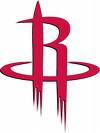
(65-17) 1st Pacific (53-29) 2nd Southwest
Point Guard: When it comes to point guard both teams have solid starters here with Derek Fisher for the Lakers and Aaron Brooks for the Rockets. While both have contributed to their teams success, only Brooksplayed an integral role in the Rockets first round success. During the first round series against the Utah Jazz, Fisher averaged a solid 29 minutes but only 9.2 points and 3 assists. For the Rockets, Brooks averaged 15.3 points and with 4.3 assists in 31.3 minutes. Although the stats are highly favourable for the Rockets in this particular category, Fisher’s playoff experience combined with his big shot ability including the oh so sweet three pointer against the Spurs with .4 seconds left back in 2004. Fisher is obviously not going to be a main offensive factor here, so he should be looking to set up screens and or dish out assists to Kobe and Pau Gasol when given the opportunity. Brooks on the other hand is going to have to continue his solid play from the 1st round against the Blazers if the Rockets plan to remain competitive. Nevertheless, experience is key here and the Rockets lack it. Edge: Lakers
Shooting Guard: The Lakers are led by MVP nominee Kobe Bryant who remains the best player on earth. The Rockets will be starting Ron Artest at the shooting guard position. In the first round Kobe averaged 26.8 points, 5.2 rebounds and 4.9 assists in 36 minutes. Artest meanwhile averaged 17.1 points, 5.2 rebounds and 3.3 assists in 35 minutes. Unlike past years in which Kobe has chosen to shoulder nearly all of the offensive load he has plenty of supporting cast members around from last years run. Kobe will obviously get his shots early and often throughout the series and any defense can only hope to contain the damage. If the Rockets can hold Kobe to under 30 points, the series will be competitive. If he approaches any shooting percentage above 60% and 30+ points it is going to be difficult to see how the Rockets can remain in the series. Artest has been a highly volatile player over the years but has avoided antics lately. He will have to continue scoring much like he did in the first series and try to dish out some assists to Yao in the low post. Edge: Lakers
Small Forward: Trevor Ariza is probably not the most well known starter on the Lakers, but he has played well in his role thus far. During the first round he averaged 8.9 points, 4.3 rebounds and 2 assists in 24 minutes. On the other side of the court will be Shane Battier, the former Duke star. Battier averaged 7.3 points, 4.8 rebounds and 2.3 assists in nearly 34 minutes. As neither player has been much of a presence offensively, their roles will certainly be more important defensively. Battier will undoubtedly be called upon to double team Kobe in many situations and limit the damage. Ariza meanwhile will probably be used to put pressure on Artest or double team Yao if the situation calls for it. Edge: Rockets
Power Forward: At the position of power forward the Lakers have the presence of all-star Pao Gasol. The Rockets will counter with the lesser known Luis Scola. Gasol averaged 18.9 points, 9.6 rebounds and 3.5 assists in 37 minutes per game. Scola meanwhile averaged 12.7 points, 8.8 rebounds and 1.5 assists in 30 minutes. Gasol will serve as the secondary threat for the Lakers behind Kobe and aggressively try to drive in the lane. Scola will have his hands full here and can only hope to stop the potential scoring barrage of Gasol. Edge: Lakers
Center: At the center postion the Lakers have 4th year player Andrew Bynum who has developed nicely into a starter. The Rockets have the towering presence of Yao Ming. Against the Jazz, Bynum’s numbers were stellar as he averaged 14.3 points, 8 rebounds and 1.4 assists per game in 29 minutes of play. Yao led his team in the first round with 19.7 points, 9.9 rebounds and 1.8 assists in nearly 34 minutes per game. Bynum is going to have a lot to deal with here as Yao’s three inch height advantage will give him a definite advantage. If Yao can continue to put up around twenty points per game, the Rockets will be pleased. Bynum on the other hand, much like Gasol is going to be called upon to make open shots when Kobe gets double or triple teamed. Edge: Rockets
Coaching: The Lakers are coached by Phil Jackson while the Rockets are coached by Rick Adelman. There is really little left to be said about Phil Jackson as he has nine NBA championships which is still tied for most with Red Auerbach. Adelman meanwhile has also been fairly successful as he led the Kings to the playoffs in all eight seasons as a coach and now both years with the Rockets. Due to the many different times that Adelman lost to the Lakers in the playoffs with the Kings, he will definitely be looking for some payback. Although, it will definitely be an uphill battle, Adelman must be commended for finally getting the Rockets over the first round hump. Edge: Lakers
Prediction: This series is definitely going to be an uphill battle all the way for the Rockets. Although they definitely have the talent to pull off a potential upset, they are going to have to stop Kobe,Gasol and Bynum in four different games. Ultimately, they are just overmatched in nearly every department. Lakers in 5
 VS.
VS. 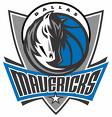
(54-28) 1st Northwest (50-32) 3rd Southwest
Point Guard: The Nuggets have one of the best in the game at this position in their key point guard Chauncey Billups, while the Mavericks have Jason Kidd. In the first round matchup with the New Orleans Hornets, Billups averaged 22.6 points, 4 rebounds and 7.4 assists in 36 minutes per game. Kidd was slightly less productive averaging 10 points, 6 rebounds and 5.6 assists in 37.2 minutes. When the Nuggets traded Allen Iverson for Billups in the middle of the season, they could not have predicted that the trade would work out so well. However, Billups has been brilliant in the half season for the Nuggets. Despite being past his heyday, Jason Kidd remains just as dangerous as ever when it comes to dishing out assists. Overall, both of these players are going to have to run the offensive sets well if they want to win. Although both of these players are amongst the best to have played their position in the current era, Billups is more of a multithreat than Kidd. Edge: Nuggets
Shooting Guard: At this position it is fairly a toss up as the Nuggets have Dahntay Jones while the Mavericks use Antoine Wright. Neither player served as a particularly inspiring threat in their respective first round series. Jones averaged 8.2 points, 2.2 rebounds and .2 assists per game in nearly 19 minutes. Wright averaged 5.2 points 1.4 rebounds and .4 assists in 13 minutes. Overall, neither player figures to be a major player. Edge: Even
Small Forward: The Nuggets will put forth Carmelo Anthony at this position while the Mavericks will counter with Josh Howard. In the first round, Anthony led his team with 24 points, 6rebounds and 5.2 assists in nearly 37 minutes of action. Howard’s numbers were also quite good as he averaged 18.8 points, 5.4 rebounds and 1.4 assists in 32 minutes. If the Nuggets plan to win the series, they are going to have to rely heavily on Anthony for his continued offensive presence both down low and outside. Howard will have to keep up the offensive production but attempt to limit the point totals for Anthony. Edge: Nuggets
Power Forward: Kenyon Martin will look to post more solid postseason numbers in this round, but will be going up against the offensive leader of the Mavericks, Dirk Nowitzki. Martin’s numbers in the first round were 10 points, 6.2 rebounds and 3 assists per game in 32.6 minutes. Nowitzki led his team in scoring averaging 19.2 points, 8.6 rebounds and 2.2 assists in 37 minutes. Martin may not pose the same offensive threat to score as he did back when he was with the Nets in the early part of the decade, but he doesn’t have to as that role will fall upon others. Nowitzki is going to be a crucial component if the Mavericks are going to win. If Nowitzki is contained by Martin then the edge in the series will definitely be for the Nuggets. Edge: Mavericks
Center: The Nuggets have the Brazilian star Nene at center while the Mavericks will match up against him with Erik Dampier. Nene averaged 9 points, 7.8 rebounds and 2.4 assists in 29.6 minutes. Dampier had slightly lower numbers averaging 8.4 points, 8.4 rebounds and 1 assist per game in 30 minutes. While neither player is particularly dominant, they will attempt to create a presence down low and get as many offensive boards as possible. In this case, both players have similar numbers and neither one really stands out. Edge: Even
Coaching: The Nuggets are led by coach George Karl who has the Nuggets returning to the playoffs for the fifth time in his five years as coach. The Mavericks are led by newcomer Rick Carlisle who has them in the playoffs in his first year. Karl has not had much postseason success as the Nuggets have lost in the first round the previous four times. However, this year it appears to be different as they are playing a much more balanced brand of basketball. Dallas seems to make the playoffs every year regardless of who is the coach only to falter. Both coaches have done very well both with their current teams and prior ones as well. However, Karl is lucky in that he won’t have to face massive pressure if they let a game or two slip. Although Dallas owner Mark Cuban has been quite thus far, I expect him to blow up at some point in this series and it will be highly detrimental to the success of the Mavericks. Edge: Nuggets
Prediction: This series will certainly be a lot closer than the other series in this conference, however I expect the Nuggets to win due to the offensive presence of Carmelo and Billups. However, they will also need some contributions from Nene and Kenyon Martin if they plan to win. The Mavericks meanwhile will be relying heavily on the trio of Nowitzki, Howard and Terry, but I just don’t think it will be enough in the end. Nuggets in 7.
May 03, 2009 • General
Aleksander Delchev (2647) – Hikaru Nakamura (2699), French League (7) 3.5.2009
1.e4 d6 2.d4 g6 3.Be3 Bg7 4.Nc3 a6 5.f4!? b5 6.Bd3 Bb7 7.Nf3 Nd7 8.e5 c5!? 9.Be4 (diagram)
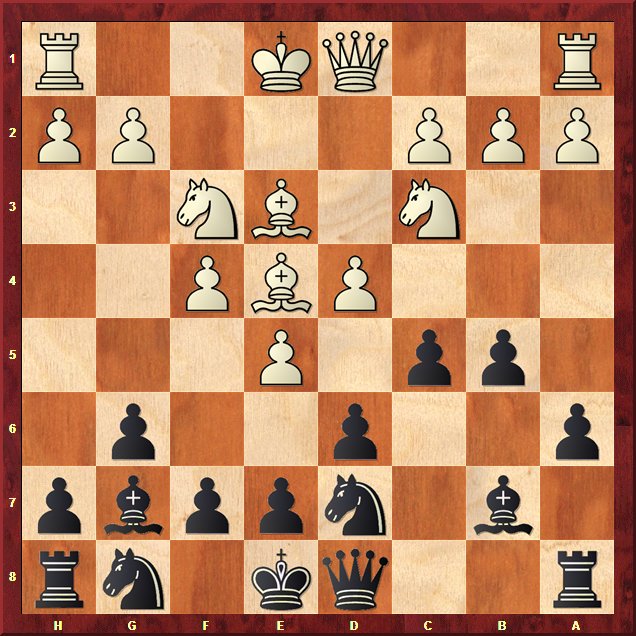
9…Qc8 10.Bxb7 Qxb7 11.dxc5 dxe5!? (According to GM Finkel Black is supposed to play 11…dxc5 however, after 12. Qd5 Qxd5 13.Nxd5 Rc8 14.0-0-0 Nh6 15.Rhe1 White has a big advantage. However, as my game proves the variations are not so clear after 11…dxe5.) 12.Qd5! (diagram)
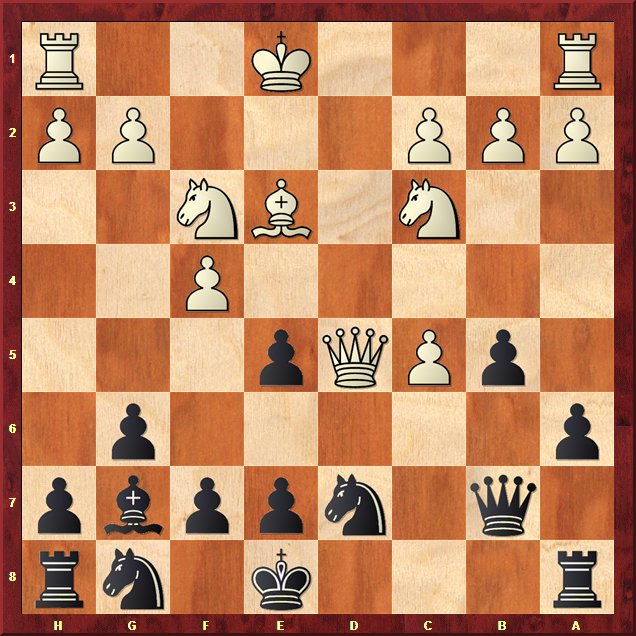
12…Qxd5 13.Nxd5 Rc8 14.Nb6 Nxb6 15.cxb6 Nf6 (15…e4 was featured in the game Grischuk-Bacrot, Fide Grand Prix Dubai 2002 but after 16.Ne5 Bxe5 17.fxe5 e6 18.Bc5! Ne7 19.Bd6 Bacrot would resign within ten moves.) 16.0-0-0 Ng4 17.b7 (17.Rhe1 was played in the game Mortensen-Hillarp Persson, Denmark 2003. But after 17…Nxe3 18.Rxe3 Bh6! 19.Ra3 Bxf4+ 20.Kb1 e4 21.Nd4 Rd8 white was completely lost.) 17…Rb8 18.Bb6 (I also considered the following variations. A) 18…0-0 19. Rd7 Nf6 20. Rhd1 Nxd7 21.Rxd7 Bh6 22.Kd1! Bxf4 23.g3 e4 24.gxf4 exf3 25.Ke1 f6 26.Kf2 Kf7 27.Bc5 Rfe8 28.Kxf3 Ke6 29.Rc7 to be extremely unpleasant. B) 18…e6 19.h3! Nf6 {19…Rxb7? 20.Rd8 Ke7 21.Rxh8 Bxh8 22.Bc5 winning a piece} 20.Rd8 Ke7 21.Nxe5! Rhxd8 22.Nc6 Kd7 23.Nxd8 Nd5 24.Rd1 to be completely winning for White.) 18…f6 19.Rd8 (19.h3 was also possible however, White fails to obtain any advantage after 19…Rxb7 20.Rd8 Kf7 21.Rxh8 Bxh8 22.hxg4 Rxb6 23.Rxh7 Bg7 24.fxe5 fxe5 with approximate equality.) 19…Kf7 20.Rd7 (diagram)
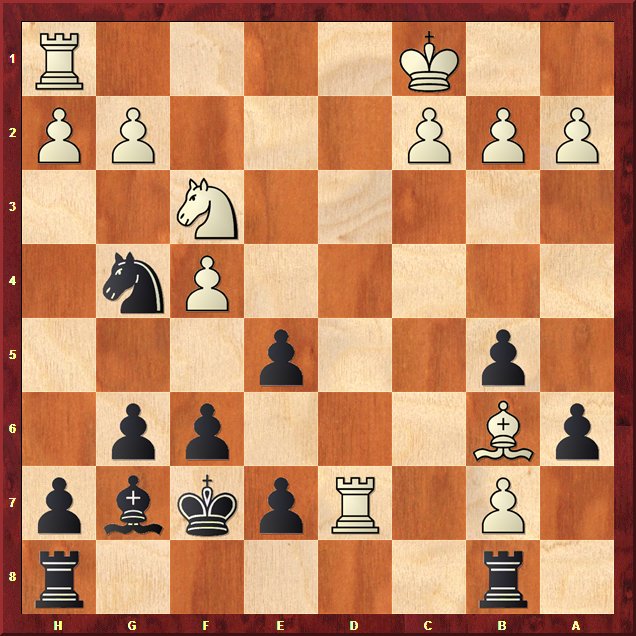
20…Bh6! 21.g3 (21.Re1 concerned me a lot more as I did not see how I would obtain counterplay after 21…Bxf4 22.Kb1 Ke6 23.Rc7 followed by either Nd4 or Ba7.) exf4 22.Kb1 Ne5! 23.Nxe5 fxe5 24.Ba7!? (According to the engines this is not the best move. However, after 24.Bc5 Rhe8 it is hard to see how White can make progress due to potential passed f and e pawns.) 24…Ke6 25.Rhd1 f3! (The pawns go marching towards promotion!) 26.Rc7 e4 27.Rdd7 Rhe8 (diagram)
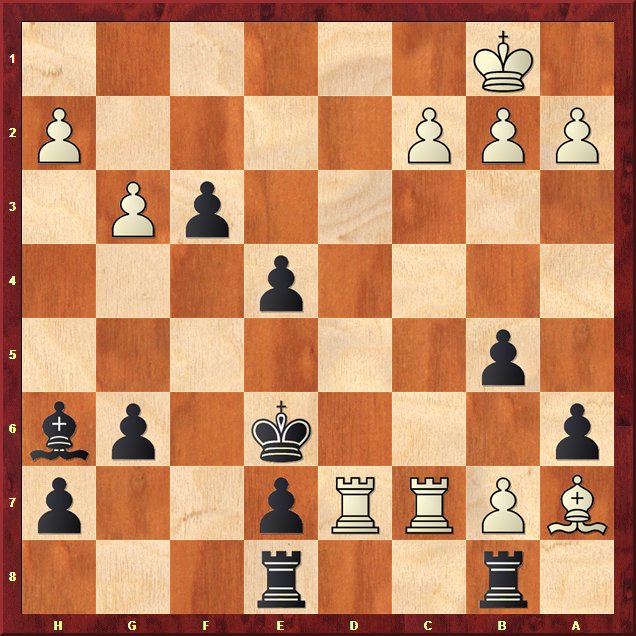
28.a3 (28.Bxb8 did not work in view of 28…f2 29.Rd1 Rxb8 followed by e3-e2.) Bg5! ( Not the easiest move to find as it looks like everything should be winning. For instance if I had tried 28…e3 29.Bxb8 f2 30.Rxe7! Rxe7 31. Rxe7 Kxe7 32.Bd6 Ke6 33.b8=Q f1=Q+ 34. Ka2 Qc4 35.Kb1 e2 36.Bb4 Qxb4 should be winning, but I was worried about overlooking some checks.) 29.h4 e3! 30.Bxb8 f2 31.Ba7 f1=Q+ 32.Ka2 e2 (diagram)
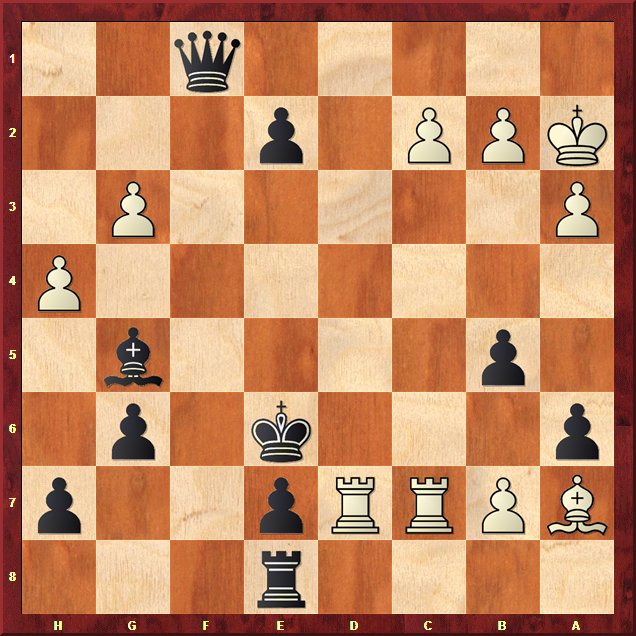
0-1
Overall I am still quite unsure about this game as it seems to be very confusing. At the start I thought I was in a lot of trouble, but after I got in 23…Ne5 I thought that I would at least draw if not more. Therefore, the ultimate conclusion which I come to is that more analysis is needed before a conclusive evaluation can be reached in this theoretical variation of the modern.
As the second leg of the French League draws to a close, our team has a substantial lead in the A group ahead of our nearest rival Clichy who trails us by seven points. In general, the results of the players have been spectacular thus far with Vachier-Lagrave, Feller and Milliet all having scored 6.5/7! While Svidler and I both have 3.5/4 respectively. The final four rounds will be played at the end of May and hopefully we can repeat our success then.
For now, I am just going to rest up and relax before the US Championship which starts on Friday of this week. Hopefully this solid result is a sign of things to come, but once again I will just have to wait and see how things unfold. Hopefully this result will give me something to build on though after a horrible past six months. That’s all for now!
Team Results:
Marseille Echecs-Evry Grand Roque (0-5)
Bacrot-Vachier-Lagrave 0-1
Svidler-DeGraeve 1-0
Delchev-Nakamura 0-1
Feller-Nataf 1-0
Gozzoli-Yusupov 1/2-1/2
Jednyak-Relange 1/2-1/2
Marzolo-Hauchard 1/2-1/2
Milliet-Delorme 1-0

 VS.
VS. 
 VS.
VS. 






